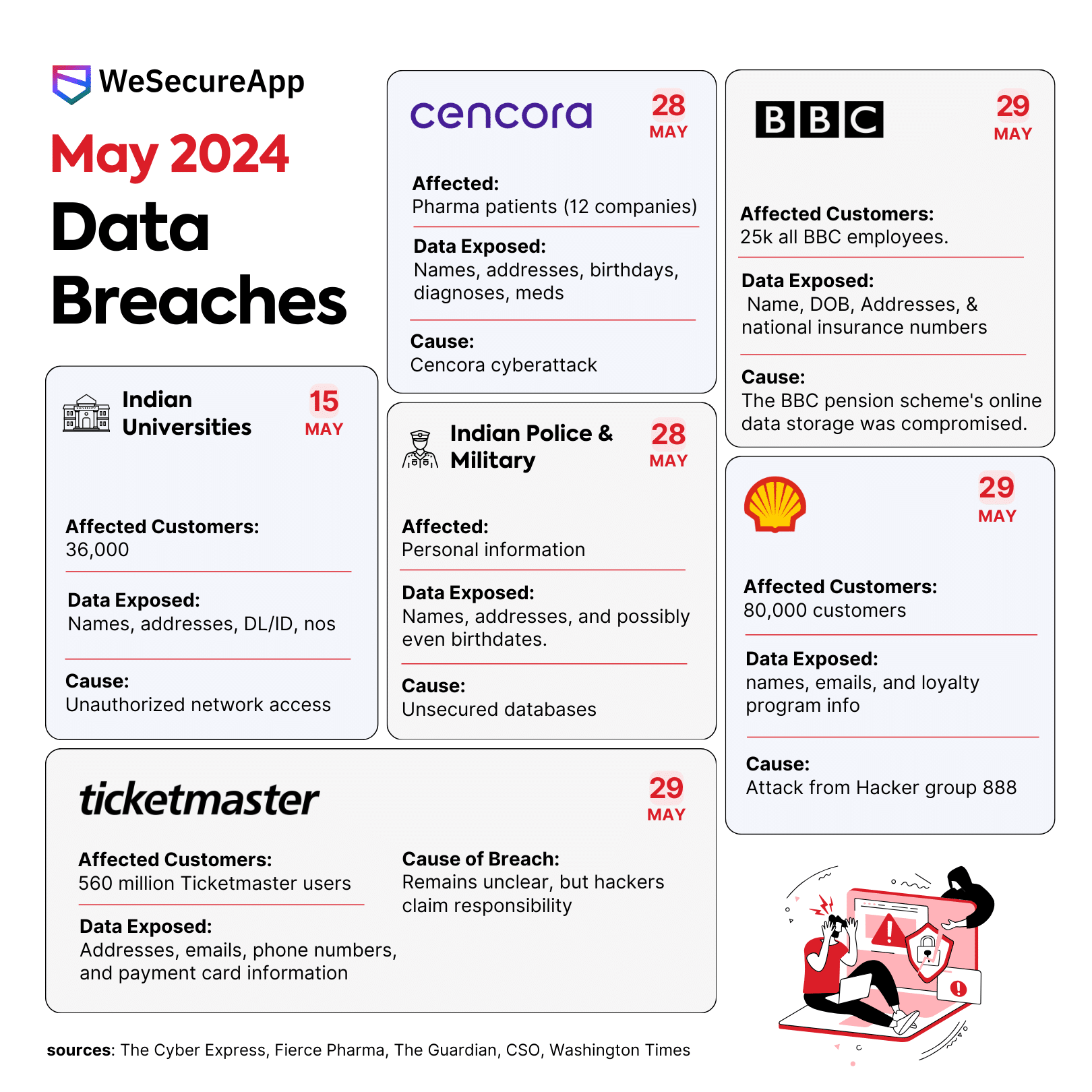
- Home
- Services
- Solutions
- Compliance
- RBI Cyber Security Framework For Banks
- SEBI Cyber Security & Cyber Resilience Framework
- UIDAI – AUA KUA Compliance Security
- RBI Guidelines for Payment Aggregators & Payment Gateways
- RBI Cyber Security Framework For Urban Cooperative Banks
- RBI Guidelines for cyber security in the NBFC Sector
- SAR Audit
- ISO27001
- PCI DSS
- GDPR
- Hipaa Audit
- SOC2 Assessment
- Resources
- Company
- Contact
Data Breaches in May 2024 – Infographic
Has your data ever felt…exposed? We’ve all heard about data breaches, but have you ever stopped to wonder what the real impact is? At WeSecureApp, we track cyber threats closely, and this month, we’re here to shed light on what happened in May 2024. Our infographic breaks down the numbers, showing you exactly what types of data were compromised and how many people were affected. Knowledge is power, so let’s empower ourselves together. Take a look and see what trends are emerging and how you can stay protected!

Cencora Data Breach Exposes Patient Information
A data breach at Cencora, a major pharmaceutical distributor, exposed sensitive patient information. Patients enrolled in assistance programs offered by over a dozen drug companies may be affected. The compromised data reportedly includes names, addresses, birthdates, diagnoses, and medication details. While Cencora assures there’s no evidence of misuse yet, the company is offering credit monitoring and fraud detection services to potentially impacted individuals. This incident highlights the importance of robust data security measures in the pharmaceutical industry.
BBC Pension Scheme Data Breach Affects 25,000
Personal information of over 25,000 current and former BBC employees was exposed in a data breach. The breach involved unauthorized access to a cloud storage service containing employee pension scheme data. Exposed information includes names, dates of birth, home addresses, and national insurance numbers. The BBC assures those affected that no financial information, passwords, or health data was leaked. They are investigating the cause and implementing additional security measures.
Shell Customer Data Exposed in Alleged Hack by Group 888
A hacker group called “888” claims to be behind a data breach affecting Shell customers. The attack might have impacted around 80,000 people in various countries, including India. Hackers leaked sample data on a forum, containing details like names, emails, phone numbers, and transaction history, possibly linked to Shell’s partnership with Reddy Express gas stations in Australia. Shell has not confirmed the breach yet. If true, this incident could expose customer privacy and require them to be cautious about potential scams.
Data leak exposes personal data of Indian military and police
A recent security breach exposed sensitive information about Indian police and military personnel. This leak included biometric data like fingerprints and facial scans, raising concerns about potential manipulation of election systems. The data vulnerability originated from unsecured databases managed by private companies. This incident highlights the importance of robust cybersecurity measures for protecting critical national security information.
Ticketmaster data breach exposes half a billion users’ information
Ticketmaster, a major ticketing platform, reportedly suffered a data breach affecting millions of users. A hacker group claims to have stolen personal information, including names, addresses, phone numbers, and possibly some payment details, for up to 560 million customers. This leak could put user data at risk of phishing scams, identity theft, or being sold on the dark web. Ticketmaster has yet to confirm the breach, but authorities are investigating.
SideCopy APT Campaign Found Targeting Indian Universities
A hacker group called SideCopy is targeting Indian universities. They’re sending emails with fake documents like research papers or surveys. These documents trick people into downloading malware that gives the hackers full control of the victim’s computer. This malware is especially dangerous because it can avoid detection by some security software. The hackers might be after information like student records or research data.
Final Words
May 2024 saw significant data breaches impacting millions, underscoring the urgency of robust cybersecurity measures. At WeSecureApp, we offer comprehensive penetration testing and red teaming services to help you stay ahead of threats. Our specialists simulate real-world attacks to identify and address vulnerabilities, ensuring your defenses are strong and effective. Protect your business and your clients’ trust with WeSecureApp’s proactive approach. Act now to secure your future.
Recommended Reading
Cloud Pentesting 101: What to Expect from a Cloud Penetration Test?
AWS Penetration Testing | Amazon Cloud Security
Azure Penetration Testing – Cloud Security Audits | Microsoft








